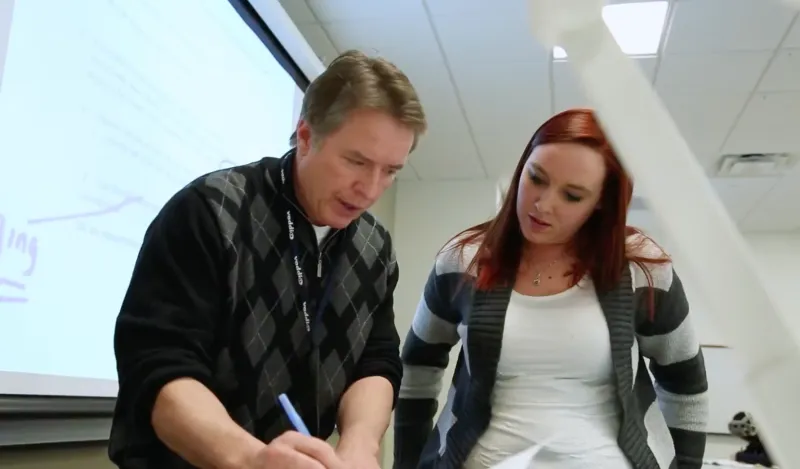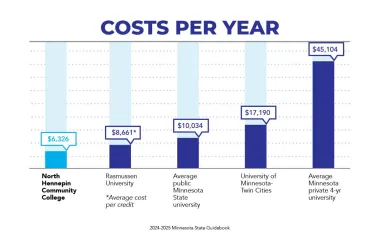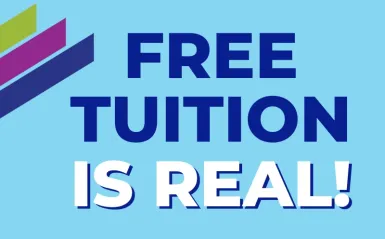
Career Outlook
Graduates of the Accounting Technology program can enter the workforce in entry-level accounting positions. The skills gained through the Accounting program are needed in every industry, and in a variety of careers. Learn more on CareerWise. If you want to increase your career options with a bachelor's degree, start with the Accounting Transfer Pathway AS degree.
Potential Job Titles
- Staff accountant
- Accounts payable specialist
- Accounts receivable specialist
- Payroll specialist
- General ledger accountant
Where NHCC Accounting Grads Work
- Berg, Debele, DeSmidt & Rabuse, P.A.
- Bowman & Brooke LLP
- Continental Property Group
- Greater Twin Cities United Way
- Health Partners
- Medtronic
- MN Dept. of Revenue
- Target Financial Services
- And more!
Paying For College
NHCC's tuition is among the most affordable in Minnesota.
Financial Aid
- Scholarships are money you don't have to repay
- Grants are money you don't have to repay
Free College Tuition
The North Star Promise scholarship program provides free college tuition to eligible students. Find out if you might be eligible.
Program Roadmaps
Program roadmaps provide students with a guide to understand the recommended course sequence to complete their degree.
Accounting Technology Curriculum
| Course Code | Title | Course Outlines | Goal Areas | Credits |
|---|---|---|---|---|
| ACCT 2111 | Financial Accounting | View-ACCT 2111 | n/a | 4 |
| BUS 1100 | Introduction to Business | View-BUS 1100 | n/a | 3 |
| BUS 1300 | Legal Environment of Business | View-BUS 1300 | n/a | 3 |
| BUS 2200 | Principles of Management | View-BUS 2200 | n/a | 3 |
| BUS 2600 | Principles of Marketing | View-BUS 2600 | n/a | 3 |
| CIS 1101 | Business Computer Systems I | View-CIS 1101 | n/a | 3 |
| CIS 1260 | Business Communications and Technology | View-CIS 1260 | n/a | 3 |
Course Title: Financial Accounting Goal Areas: n/a Credits: 4
Course Description: This course is a study of the accounting principles and concepts used to understand and develop financial statements. Topics include accruals and deferrals, revenues, expenses, assets, liabilities, equities, and cash flows. The course will analyze current industry financial statements from the point of view of investors and creditors for profitability, liquidity and risk.
Course Title: Principles of Management Goal Areas: n/a Credits: 3
Course Description: This course is an introduction to the functions of management: planning, organizing, directing, and controlling. The course explores how each of the management functions are implemented to impact organizational efficiency and effectiveness. Local, national, and global environments are presented as strategic factors to be understood by contemporary managers. The importance of managing competitively and intelligently within a diverse environment is stressed. Situational cases are completed to reinforce decision-making in each of the function areas.
Course Title: Principles of Marketing Goal Areas: n/a Credits: 3
Course Description: This course provides a market-oriented perspective to business decision-making. Students will learn how marketers provide value in satisfying customer needs and wants, determine which target markets the organization can best serve, and decide upon appropriate products, services, and programs to serve these markets. Topics include branding and product development, pricing strategies, marketing research, promotion, supply chain management, and service marketing. Current trends and developments in marketing practices are analyzed and strategic marketing ideas are implemented within an ethical framework. Courses Recommended: BUS 1100 Introduction to Business and CIS 1101 Business Computer Systems I
Course Title: Introduction to Business Goal Areas: n/a Credits: 3
Course Description: This course is designed to provide a broad overview of the functions of the for-profit and non-profit business entity. Business and its environment, organization and management, ownership, finance, production, marketing, human resources, and control systems are reviewed. The course helps students understand the contribution of business to the American economy using current business publications, media, and web resources to focus on applications of current business technologies. Business ethics and teamwork are also examined. This course will enable the student to more intelligently pursue advanced business courses and to choose a business career.
Course Title: Business Computer Systems I Goal Areas: n/a Credits: 3
Course Description: This course develops computer and digital literacy and emphasizes its importance in today's businesses and society. Through hands-on experience students will gain an understanding of computer concepts, capabilities and applications and be able to implement this knowledge in their professional and personal lives. Computer applications covered include word processing, spreadsheets, presentation graphics, databases, windows/operating system, e-mail use and management, folder and file organization and use of the Internet. Computer concepts covered include understanding computers and mobile devices, how a computer works, managing files, computer and mobile device hardware components, digital safety and security, application programs, input and output devices, digital storage options, ethical practices and Internet basics. Hands-on experience will be provided on computers in the Windows environment using the Microsoft Office Suite including Word, Excel, Access, and PowerPoint. Knowledge of the keyboard is recommended for this course. Check with your instructor for the software edition that will be used.
Course Title: Business Communications and Technology Goal Areas: n/a Credits: 3
Course Description: This course provides students the knowledge to become successful communicators in a business environment through improving and practicing written, oral, face to face, and virtual technology based communication skills, processes, and strategies. This class will incorporate the effective use of Web-based communication, video conferencing, e-mail etiquette, presentation skills, presentation technologies, teleconferencing, and telephone usage. Students will also apply improved verbal, nonverbal, listening, writing, team, conflict, and negotiation skills in organizational situations. This course is for any student wishing to increase their business communication effectiveness in a global and technological business environment.Recommended: Completion of ENGL 1201 College Writing I and CIS 1101 Business Computer Systems I.
Course Title: Legal Environment of Business Goal Areas: n/a Credits: 3
Course Description: Students will study the basic principles of law and the societal forces which influence the development of these principles. Topics include legal procedure, court structure, ethics, international law, constitutional law, administrative law, contracts, sales, torts, business entities, business regulation, and consumer protection. The focus of the course is on business entities, their employees and customers.
| Course Code | Title | Course Outlines | Goal Areas | Credits |
|---|---|---|---|---|
| ACCT 2112 | Managerial Accounting | View-ACCT 2112 | n/a | 4 |
| ACCT 2230 | Computerized Accounting with QuickBooks | View-ACCT 2230 | n/a | 3 |
| ACCT 2250 (thru S25) | ||||
| ACCT 2260 (thru S25) | ||||
| ACCT 2300 | Accounting Capstone | View-ACCT 2300 | n/a | 4 |
| CIS 1220 | Decision Making Excel | View-CIS 1220 | n/a | 3 |
Course Title: Managerial Accounting Goal Areas: n/a Credits: 4
Course Description: Managerial accounting focuses on the three main activities performed by managers: planning, controlling, and decision-making. This course consists of preparing a variety of reports for internal use and analyzing them in the company's decision-making process.Prerequisite: ACCT 2111
Course Title: Computerized Accounting with QuickBooks Goal Areas: n/a Credits: 3
Course Description: This course provides a hands-on approach to learning how current (on the market) computerized accounting systems are used and installed. The following modules are covered: general ledger, financial statements, accounts receivable, accounts payable, purchasing, inventory and payroll. Note: Knowledge of accounting debits and credits and CIS 1101 or computer experience is recommended.Prerequisite: Acct 2111
Course Title: Accounting Capstone Goal Areas: n/a Credits: 4
Course Description: This final capstone course in the accounting sequence is designed to extend and integrate your understanding of theoretical and practical issues in accounting, including the analytical and decision making processes for business enterprises. Further development of theoretical and practical issues from prerequisite courses and reinforcement of communication skills (writing, discussion, and presentation) are central elements of this course. This course will provide the student with the ability to enter the job market or transfer to a four year school with a good understanding of the accounting functions of a small business. Prerequisites: ACCT 2111, ACCT 2112 and CIS 1220 (or with instructor approval)
Course Title: Decision Making Excel Goal Areas: n/a Credits: 3
Course Description: This course uses Microsoft Excel as a problem solving tool in analyzing and designing solutions for common business and organizational problems and then using that information to guide decision-making. This course is for anyone who has to analyze, share, chart and manage information to make more informed decisions. Problems are taken from management, accounting and finance, manufacturing and production, sales and marketing and human resources. Beginning to advanced spreadsheet concepts covered include creating, editing, formatting, printing and saving worksheets, creating charts, filtering lists, creating pivot tables, inventing macros, importing data, creating data tables, evaluating and using functions, constructing formulas, integrating worksheet data with other programs and ethical Excel practices. After this course, the student would be prepared to take the Microsoft Office Specialist (MOS): Excel Exam. Knowledge of the keyboard is recommended for this course. Check with your instructor for the software edition that will be used.
| Course Code | Title | Course Outlines | Goal Areas | Credits |
|---|---|---|---|---|
| COMM 1010 | Fundamentals of Public Speaking | View-COMM 1010 | n/a | 3 |
| ECON 1070 | Principles of Microeconomics | View-ECON 1070 | n/a | 3 |
| ENGL 1200 | Gateway College Writing or | View-ENGL 1200 | n/a | 4 |
| ENGL 1201 | College Writing I | View-ENGL 1201 | n/a | 4 |
| ENGL 1202 | College Writing II or | View-ENGL 1202 | n/a | 2 |
| ENGL 1203 | College Writing II with Workshop | View-ENGL 1203 | n/a | 2 |
Course Title: Fundamentals of Public Speaking Goal Areas: 01 Credits: 3
Course Description: This course provides instruction and practical experience in the basics of public speaking. This course has a performance component: students are expected to create and deliver informative, persuasive and other types of speeches.
Course Title: Principles of Microeconomics Goal Areas: 05 Credits: 3
Course Description: This course covers theories of consumer and producer behavior as well as market structure, the role of government in the economy, distribution of income, externalities, and taxes.
Course Title: Gateway College Writing Goal Areas: 01 Credits: 4
Course Description: This class provides extended practice in critical reading, writing, and thinking skills. Students will develop an effective writing process and work to achieve college-level competence in reading and responding to texts, visuals, events, and ideas in a variety of written formats, with an emphasis on the academic essay. Audience awareness, interpretation and analysis, logical reasoning, and persuasive and argumentative skills will be developed. MLA style documentation of primary sources will be included.
Course Title: College Writing I Goal Areas: 01 Credits: 4
Course Description: This class provides extended practice in critical reading, writing, and thinking skills. Students will develop an effective writing process and work to achieve college-level competence in reading and responding to texts, visuals, events, and ideas in a variety of written formats, with an emphasis on the academic essay. Audience awareness, interpretation and analysis, logical reasoning, and persuasive and argumentative skills will be developed. MLA style documentation of primary sources will be included.
Course Title: College Writing II Goal Areas: 02,01 Credits: 2
Course Description: This class focuses on the research process, textual analysis of primary and secondary sources, rhetorical strategies for argument and persuasion, and successful integration of sources into a longer academic paper utilizing MLA (or other, as appropriate) documentation format. The class may be disciplinary, interdisciplinary, or topical in content.
Course Title: College Writing II with Workshop Goal Areas: 01,02 Credits: 2
Course Description: This class focuses on the research process, textual analysis of primary and secondary sources, rhetorical strategies for argument and persuasion, and successful integration of sources into a longer academic paper utilizing MLA (or other, as appropriate) documentation format. The class may be disciplinary, interdisciplinary, or topical in content.
| 15 Credits must be earned at NHCC |
| Total Credits Required | 60 |
2025-2026
An Accountant examines, analyzes and interprets accounting data for the purpose of giving advice and preparing financial statements. Duties may include performing such activities as recording receipts and disbursements, and preparing state and federal reports. The accountant may prepare reports and financial statements electronically.
NHCC also offers an Associate in Science A.S. degree in Accounting for students who are interested in transferring their credits to earn a baccalaureate degree at a four year institution.
Knowledge of Human Cultures and the Physical and Natural World:
- The theory and practice of the accounting process
- Basic knowledge of business taxation and payroll
Intellectual and Practical Skills:
- How to analyze financial information and make business decisions using critical thinking and problem solving skills
- How to communicate effectively, in oral and written forms
Personal and Social Responsibility and Engagement:
- How to evaluate professional responsibilities, including ethical issues
Integrative and Applied Learning:
- Use of technology including Microsoft Word, Excel and QuickBooks
Upon completion of the program the student will be prepared for entry level work in the accounting field. Courses in this degree may transfer to four year colleges. Consult with an advisor for further information.
Program roadmaps provide students with a guide to understand the recommended course sequence to complete their degree.
Information on careers, including career descriptions, salary data, and employment outlook is available on the Bureau of Labor Statistics website and O*Net Online website.
A student shall:
- Earn a minimum of 60-71 semester credits as required in the program with a grade point average of 2.00 (C) or above in courses taken at North Hennepin Community College. Specific programs may have additional requirements or a higher minimum grade point average.
- Earn a minimum of 15 semester credits at North Hennepin Community College.
- Earn 20 credits in at least 3 MnTC goal areas
Completion of an A.A.S. degree fulfills the Goal Area 2 requirement of the Minnesota Transfer Curriculum (MnTC).
Developmental Courses
Some students may need preparatory course(s) in Math and/or English. Courses numbered below 1000 will not apply toward a degree.
Equal Opportunity Employer and Disability Access Information
North Hennepin Community College is a member of Minnesota State Colleges and Universities system and an equal opportunity employer and educator. This document is available in alternative formats to individuals with disabilities by calling 7634930555 or through the Minnesota Relay Service at 18006273529.
The Associate in Applied Science (A.A.S.) degree is intended for those students who plan to use the competence gained through their degree for immediate employment or enhancing current career skills. The A.A.S. degree includes a minimum of 20 semester credits in general education selected from at least three of the ten goal areas of the Minnesota Transfer Curriculum (MnTC). The MnTC courses within the A.A.S. programs transfer to any Minnesota State College or University. Many of the A.A.S. degree programs have articulation agreements with four year institutions for transfer of the program.
A student shall:
- Earn a minimum of 60-71 semester credits as required in the program with a grade point average of 2.00 (C) or above in courses taken at North Hennepin Community College. Specific programs may have additional requirements or a higher minimum grade point average.
- Earn a minimum of 15 semester credits at North Hennepin Community College.
- Earn 20 credits in at least 3 MnTC goal areas
Completion of an A.A.S. degree fulfills the Goal Area 2 requirement of the Minnesota Transfer Curriculum (MnTC).
Developmental Courses
Some students may need preparatory course(s) in Math and/or English. Courses numbered below 1000 will not apply toward a degree.
Equal Opportunity Employer and Disability Access Information
North Hennepin Community College is a member of Minnesota State Colleges and Universities system and an equal opportunity employer and educator. This document is available in alternative formats to individuals with disabilities by calling 7634930555 or through the Minnesota Relay Service at 18006273529.
North Hennepin Community College is accredited by the Higher Learning Commission (hlcommission.org), an institutional accreditation agency recognized by the U.S. Department of Education.
30 N. LaSalle Street, Suite 2400
Chicago, IL 60602-2504
1-800-621-7440
Get Started
If you're ready to get started, apply to NHCC. If you'd like to learn more, you can visit campus or request information.

